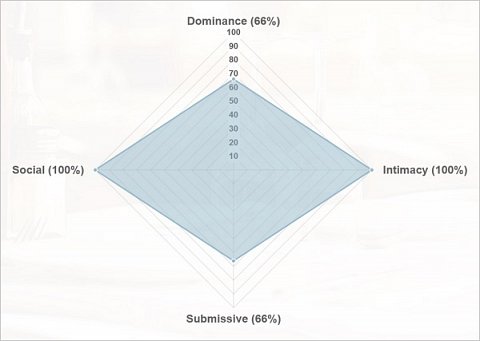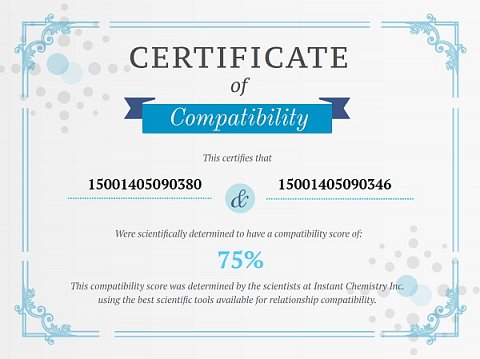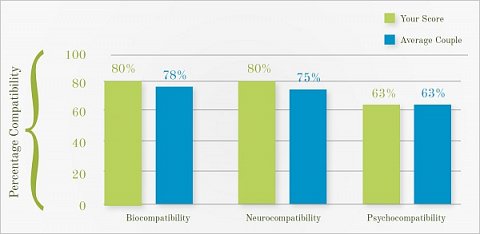-
Relationship Compatibility Test
review on 30 October 2015
by Guest Editor

At a Glance
Summary
I can’t deny that I was very sceptical about this test, but having gone through the results with my boyfriend, I’m pretty impressed. I know that it takes more than a personality test to explain someone’s behaviour, and that our genes don’t dictate our psychological make-up, but Instant Chemistry got a lot more right than they got wrong when it comes to my relationship with my boyfriend.
There are definitely times when the advice feels way too generic to be useful, and a few results seemed completely wrong. It also felt like Instant Chemistry tried too hard to make the results a ‘feel good’ experience for everyone, ensuring no couple is given a low score.
On balance, I’d recommend this test to a couple who’ve been together for a few years and want a fun way to ‘kick the tyres’ on their relationship – it doesn’t feel like a test for people who’ve just started dating. The results caused my boyfriend and I to have a few interesting discussions, and I really do think it’s brought us a little bit closer together.
Full Review
The Instant Chemistry couples test has been on our radar for a while but it wasn’t until recently that a member of our editorial team (Katie) managed to convince her boyfriend to try it! Instant Chemistry claim their test shows couples what makes their relationship tick, and indicates where it’s strengths and weaknesses may lie. Needless to say, Katie was intrigued, here’s what she wrote about the experience…
Product Expectations
The Instant Chemistry site said their test would tell my boyfriend and I about our psychological compatibility, our neurocompatibility, and our biocompatibility, all packaged in a way that would help our relationship grow. To complete the test, we’d both need to provide a DNA sample (in the form of saliva) and complete an online personality test.
I’ve been with my boyfriend for many years and we’re very happy together, so I doubted a test like this would tell us anything new. That said, it’s obvious to me that a person’s psychology and genetic makeup influences how they’d function in a couple, so getting a closer look at these aspects seemed like a fun, and possibly beneficial experience.
Once Instant Chemistry received our saliva samples and combined them with the results from our personality tests, we were told we’d be able to login to see our results. Although there was a fun video on the site which went through some of Instant Chemistry’s media coverage, I couldn’t find an example of what the results would look like.
Ordering Experience
Ordering was really easy, I just typed in my info and my boyfriend’s email address and after clicking submit, we were both sent login information to complete our personality tests.
The personality tests comprised a series of multiple-choice questions and after submitting my answers, I was given a personality breakdown:

My personality breakdown.
For each of the four categories, I was given a written description of my result. For ‘Social’ I was told that I’m very outgoing and drawn to people who are “very desirous of interacting” (this isn’t news to me, I know I’m an extrovert). I was also told that I’m highly likely to turn to others for stimulation and encouragement. At the end of the description, I read that “two outgoing people are likely to have a good relationship, as long as their need for interaction with other people doesn’t take them too far away from each other”. I thought this was interesting but it wasn’t a revelation.
For ‘Submissiveness’ I was told I’m a ‘giver’ (which is definitely true) and that I value getting along with others. I was disgruntled to see my boyfriend scored lower for submissiveness than I did, the last thing he needs is licence to take advantage of my giving nature!
For ‘Dominance’ I learned that I can be a very assertive person (which is true) and that my ideal partner should be moderately submissive, or else we could encounter “power struggles”. Well, we have power struggles all the time but they’re usually light-hearted and rarely acrimonious (when I get my way anyway!).
For ‘Intimacy’ I read that my high score means I’m more aware of my feelings than most, and that I highly value openness and affection. The full explanation of this result made good reading, but ultimately said I’d be happiest with someone who shares this trait.
The interesting thing about the results is that I only saw my own personality profile, I didn’t see any sort of comparison with my boyfriend’s which is what I was expecting. I wouldn’t say Instant Chemistry’s personality test is ground-breaking or even original, but hopefully results would come in to play when incorporated with my genetic results.
A few days after ordering we were sent the saliva collection kit which was super simple to use. After sending our samples back we didn’t receive confirmation that they’d made it to the lab.
The Results
Four weeks after dispatching our samples, my boyfriend and I each received an email from Instant Chemistry containing the results as a 27-page PDF report. There were five sections to the report: My ‘Immune System’, my ‘Neurogenetics’, my ‘Psychology’, ‘Certificate’ (showing my boyfriend and I are 75% compatible!), and our ‘Overall Compatibility’. This last section gave us our biocompatibility, neurocompatibility, and psych compatibility.
The opening page revealed that no couple has yet received a perfect score for all measures of compatibility. Instant Chemistry went on to explain that the test is not meant to score our satisfaction as a couple, but to highlight the possible strengths and weaknesses, and to help us explore our relationship.
I read that the report would later provide tips to help us nurture our relationship and help it grow. I was sceptical, but I read on…
Results Section: My Immune System
This section contained my HLA results as a table which, at first glance, I didn’t understand. It went on to say that the Human Leucocyte Antigen (HLA) system is a diverse set of genes that affect our immunity AND our body odour. Instant Chemistry revealed that studies have shown men and women are more sexually attracted to partners with HLA genes dissimilar to themselves. Couples with dissimilar genes also report higher relationship satisfaction and greater sexual compatibility.
I saw that three of my HLA genes had been tested, and the variant I possessed for each of these genes was displayed, but I was told they wouldn’t be compared to my partner’s results until later in the report.
Results Section: My Neurogenetics
This section contained my neurogenetic results as a table:

My neurogenetic results.
I could see that four genes had been analysed, and that the variants I possessed made me practical, a builder, a thinker, and a warrior! The section went on to discuss why each gene had an impact on my personality and gave me these attributes… Serotonin affects emotional responses, dopamine affects the desire to seek out new sensations and experiences, oxytocin (OXTR) affects empathy, and COMT (a gene affecting the breakdown of dopamine) affects working memory, reasoning, and problem solving.
The information was interesting but I would have liked to have seen the other possible attributes. Just like the immune system section, my results hadn’t yet been compared to my boyfriend’s which is what I was eager to see!
Results Section: My Psychology
This part of the report had already been made available to me in the online account after completing the personality test (as discussed above). It went through my dominance, intimacy, submissive and social scores, but didn’t yet compare these results to my boyfriend’s.
Results Section: Certificate
The certificate indicated that my boyfriend and I had a ‘scientifically determined’ compatibility score of 75%:

Our Certificate of Compatibility.
As you can see, the certificate is almost designed as something you’d display, but I think we’d have to have our names on it instead of numbers, and we’d need a much higher score to justify us showing it off!
Straight away we were keen to know what the average, lowest, and highest possible scores are. We felt 75% was a disappointing result, we’re one of the best couples we know (and the most competitive) and we thought the results would bear this out!
Results Section: Overall Compatibility
Instant Chemistry told us that it’s theoretically possible to get 100% compatibility, but that this is virtually impossible as there are 40,000 possible combinations of attributes. We read that 75% means we’re compatible in some areas, but not in others. A table displayed our scores for each component compared to the average:

Our compatibility compared to the average.
It was good to see that we were better than average for biocompatibility (we got 80% compared to the average 78%) and neurocompatibility (we got 80% compared to the average 75%), and good to see that we were average in terms of psych compatibility (we got 63%). That said, we were still disappointed that our results weren’t significantly better than average.
Results Section: Biocompatibility
Going into each component, there was more info on the biocompatibility aspect of the test, telling us that most long-term couples score 80%. Apparently, 75-84% is an optimal balance for biological and psychological compatibility. Instant Chemistry said that we should maintain a good balance in our relationship, working on both the physical attraction component (e.g. by making time for romantic dinners and weekend getaways), and the psychological component (e.g. by finding new shared interests). To be honest, these ‘tips’ seemed so obvious that they weren’t really of value.
Results Section: Neurocompatibility
For the neurocompatibility component we were shown a table that compares our results for four genes:

Our neurocompatibility comparison.
We read that couples receive either 50%, 75% or 100% compatibility for each gene - there are no scores in between. This is because there’s only two possible variants for each gene. I thought it was odd that the most incompatible combinations still resulted in a score of 50% compatibility!
For serotonin we got a 75% match, and my boyfriend and I were told that we differ in our responses to emotional change in our relationship. Couples with this score have highs and lows in their relationship (this seemed like a pretty generic observation) and that we should recognise that sometimes the other person will have a stronger or weaker reaction to arguments or disagreements. I have to admit, in certain situations, I’ll have an extreme reaction and my boyfriend will remain quite unemotional – this result definitely sheds light on this difference!
Instant Chemistry said that for relationships where positive situations outweigh negative ones, relationship satisfaction will increase over time, but where negative situations outweigh positive ones, the opposite is true. Unfortunately, it didn’t seem clear what ‘outweigh’ meant in this context, I presume they meant ‘outnumber’ but I wasn’t sure. Instant Chemistry then went on to tell us that we should be aware that we each respond differently to situations, and by being sensitive to this, we’d be able to minimise the number of situations that turn negative.
For dopamine we got a 75% match, and were told that we’re more level headed than those carrying the ‘explorer’ version of the gene. We read that we likely complement each other in terms of how impulsive and adventurous we are, but that we should consciously make the effort to undertake adventurous activities together.
For oxytocin we got a 75% match, and we were told that one of us (my boyfriend in this case) is better at interpreting the other’s emotions. This doesn’t feel accurate to me. Instant Chemistry went on to say that my boyfriend should consciously communicate his feelings to me verbally, which he’s already very good at. It was interesting to read that this gene is highly influenced by the environment, and that life experiences can actually increase our effectiveness when interpreting other people’s emotions. This might explain why I think I’m pretty good at it, despite possessing the wrong genetic variant.
For COMT (the gene affecting dopamine breakdown) we got a 100% match! We read that although we carry different variants of this gene, they’re complimentary to each other. Apparently I’m more resilient to negative events and experience less anxiety, whereas my boyfriend gets more pleasure out of life and may use this trait to help me enjoy experiences that I normally might not. I found it a bit tricky to wrap my head around this one, we love doing things together, and isn’t it obvious that I’d enjoy them less if I was on my own? The report went on to say that my boyfriend is likely to be more creative than I am (I’m not sure I agree with that) and he may use this to find creative ways to keep me happy. I have to say, he always puts the effort into birthdays, Christmas and valentine’s day, so perhaps this is partially due to his COMT gene…
Instant Chemistry also said that as I was more resilient, I may be using this trait to help my boyfriend through situations he’d normally find more difficult. We agreed that this strikes a chord with us.
Results Section: Psychological Compatibility
For psych compatibility we got a 63% match. We read that we were both very social (true), and that we’d rarely need to negotiate when it comes to social events (also true). I also learned that I’m highly desirous of affection (embarrassingly yes) and that my boyfriend is less so (which is true). I found some of Instant Chemistry’s advice on this aspect to be quite insightful, I was advised to accept my boyfriend’s “less expressive style”, and to bear in mind that he’d be a naturally more private and less affectionate person. He’s definitely less affectionate that I am, but I just put it down to him being a guy! It’s interesting to consider a genetic explanation for this difference in our behaviour.
The report went on to say that I’m inclined to be accommodating in a relationship, but that I’m not a pushover (true), while my boyfriend is more strong willed than I am (I totally disagree!). Instant Chemistry advised that we both need to draw on strong conflict resolution skills so our relationship goals are more easily attainable.
At the end of the report there were some final thoughts, reminders that a test like this wouldn’t be able to fully capture the complexity of a relationship, and a few other caveats. I also read that the test is not deterministic but informative - it should be used as a guide to improve our relationship, not as a way of discounting a future with the other person!
Summary
I can’t deny that I was very sceptical about this test, but having gone through the results with my boyfriend, I’m pretty impressed. I know that it takes more than a personality test to explain someone’s behaviour, and that our genes don’t dictate our psychological make-up, but Instant Chemistry got a lot more right than they got wrong when it comes to my relationship with my boyfriend.
There are definitely times when the advice feels way too generic to be useful, and a few results seemed completely wrong. It also felt like Instant Chemistry tried too hard to make the results a ‘feel good’ experience for everyone, ensuring no couple is given a low score.
On balance, I’d recommend this test to a couple who’ve been together for a few years and want a fun way to ‘kick the tyres’ on their relationship – it doesn’t feel like a test for people who’ve just started dating. The results caused my boyfriend and I to have a few interesting discussions, and I really do think it’s brought us a little bit closer together.
Please note that we were invited to take this test free of charge.


